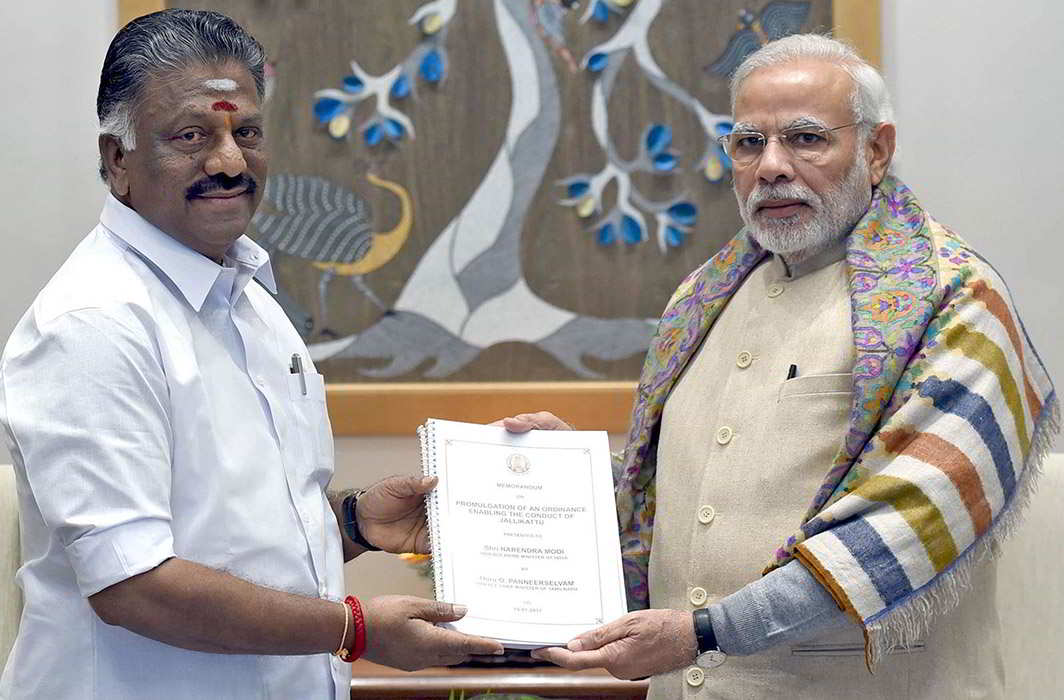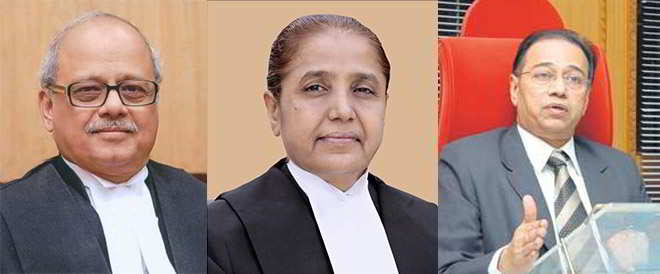
In a huge relief to the Tamil Nadu government and its people, the Supreme Court refused to stay a bill permitting this sport. This has acted as a dampener for animal rights activists
~By R Ramasubramanian in Chennai
The Tamil Nadu government received a huge relief from the Supreme Court on January 31 when it refused to stay a new act permitting Jallikattu. The act, passed by the state government, was challenged by a batch of petitions filed by the Animal Welfare Board of India (AWBI), NGO Compassion Unlimited Plus Action and others.
A division bench headed by Justice Deepak Misra, however, agreed to examine both the constitutional and legal validity of the act and ordered notices to the centre and the Tamil Nadu government returnable in six weeks. The Supreme Court also expressed displeasure over the massive protests in Tamil Nadu against the ban and reminded the state government that its primary duty was to maintain law and order and ensure rule of law.
Amidst these protests, the assembly on January 23 had passed a bill paving way for conducting Jallikattu. The bill replaced an ordinance which was promulgated on January 21 by acting governor C Vidhyasa Rao after the President’s ascent. The ordinance was necessitated as the Supreme Court in a May 7, 2014 order completely banned Jallikattu by stating that the sport was inherently cruel in nature. A review petition by the Tamil Nadu government in this regard was also dismissed by the Supreme Court on November 16, 2016.
After every legal avenue was shut and week-long protests were held at Marina Beach, the state government was forced to choose this path and amended a few sections in the Prevention of Cruelty to Animals Act 1960. The bill was passed unanimously in the assembly.
Usually an amendment to a central law could be brought in only through the parliamentary route. However, if the subject of the legislation is on the concurrent list, then the state government too has jurisdiction over it. As the subject of Prevention of Cruelty to animals is the 17th item on the concurrent list, the state government has powers to amend it and this is precisely what the Tamil Nadu government has done.

Panneerselvam said: “All possible grounds of assault on Jallikattu found in the central law – PCA Act 1960 – had been addressed in the state’s amendments. The ordinance which became law on January 23 takes care of the list of prohibited animals part and specific exemptions for using bulls in Jallikattu, and makes it clear that it would not amount to cruelty. Instead of just harping on the religious aspect of Jallikattu alone, we are emphasizing the need to protect the native breed of bulls for posterity.” He added: “Jallikattu has been defined as an event involving bulls conducted with a view to follow tradition and culture. The bill includes Jallikattu and its variants like ‘manjuvirattu’, ‘Vadamadu’ and ‘erudhu vidum vizha’. This Bill amends Sections 2,3,11, 22, 27, 28 of the Act to facilitate Jallikattu.”
Usually an amendment to a central law could be brought in only through the parliamentary route. However, if the subject of the legislation is on the concurrent list, then the state government too has jurisdiction over it. As the subject of Prevention of Cruelty to animals is the 17th item on the concurrent list, the state government has powers to amend it and this is precisely what the Tamil Nadu government has done.
The original ban on Jallikattu was imposed by Justice R Banumathi of the Madras High Court (MHC) while hearing a writ petition which prayed for sanction to conduct rackla (bulls pull a wooden vehicle) race at Ramanathapuram district in 2006. Then suddenly, the case took a new turn when she banned rackla race, oxen race and Jallikattu, all in one order.
L Shaji Chellan, a lawyer at the Madurai bench of the High Court who was the counsel for the petitioner, explained: “My client was K Muniasamy Thevar of Karisalkulam Panchayat in Ramanathapuram district. He wanted to conduct rackla race in his village. I was arguing, citing various judgments of the MHC, at the Madurai Bench. The judge was reluctant. After lunch time, when the hearing resumed, suddenly Justice Banumathi said that under the Prevention of Cruelty to Animals Act 1960 events like rackla race, oxen race and Jallikattu cannot be allowed and banned all these sports. The Court did not even issue notices to the respondents cited in my petition, which includes the government side, and imposed a blanket ban.”
The Tamil Nadu government appealed against this ban in the latter half of 2006. A division bench of the MHC allowed Jallikattu for 2007 and 2008. But the Animal Welfare Board of India (AWBI), PETA and other animal rights activists joined the case by impleading. They consistently raised the issue of cruelty to animals and in 2009, the Tamil Nadu government brought an act, the Tamil Nadu Regulation of Jallikattu Act 2009, which paved the way for conducting Jallikattu with stringent conditions to ensure the protection to both bulls and bull tamers.
This was challenged by the animal rights activists in the Supreme Court. Meanwhile, the Ministry of Environment and Forests (MoEF) brought in a notification in 2011 which included bulls in the list of non-performing animals. This meant they could not be used in sports like Jallikattu.
The tide turned against bull tamers when the Supreme Court in a judgment on May 7, 2014, struck down the 2009 Jallikattu Act and banned it permanently. A bench of Justices KS Radhakrishnan and Pinaki Chandra Ghose ruled: “Forcing a bull and keeping it in the waiting area and subjecting it to the scorching sun are not for the animal’s wellbeing. Forcing and pulling the animal by a nose rope in to the closed, narrow enclosure called ‘Vaadivasal’ (entry point) subjecting it to all forms of torture, pain and suffering by forcing it to go in the arena and overpowering it in the area by bull tamers are not for the well being of the animal. AWBI had submitted with adequate proof and material how much cruelty was inflicted on the animals. The organizers of the sport deprived the animals of their rights guaranteed under Section 3 of the Prevention of Cruelty to Animals Act 1960. Perversity and sadism are writ large in the actions of the organizers of Jallikattu and the event is not meant for the wellbeing of the animal but for the pleasure and enjoyment of human beings.”
Prevention of Cruelty to Animals Act 1960 is a welfare Act and it was a settled position in law that if there is a clash between an activity connected with culture and a welfare Act, it is the latter which shall prevail.
—Supreme Court
Following this, there was no Jallikattu in 2015 and 2016. Meanwhile, the centre tried a trick to facilitate the sport when in January 2016 the MoEF issued a circular allowing bulls for Jallikattu, but at the same time, retaining them in the list of animals barred from being used for performances, i.e, reversing MoEF’s 2011 decision. This was challenged by AWBI, PETA and other animals’ rights activists. The Supreme Court stayed this circular in January 2016. However on January 31, the Supreme Court allowed the centre to withdraw this notification.

Legal observers say that there is a subtle but perceptible shift in the Supreme Court’s attitude towards Jallikkattu and it became visible after it refused to stay the new Jallikattu bill. “Yes, to me it seems like that there is a shift. Even in the last hearing on November 16, 2016, when the apex court dismissed a review petition, the same bench observed that the country cannot import Roman Gladiator type of sports in this modern age and suggested that if anyone wants to play the game of bull-taming they can do it in computer games,” Yashwant Sundararajan, an advocate in the Madras High Court told India Legal. He added: “The bench also asked the animal rights activists the ‘basis’ of their challenge to the new law. It also pointed out that the declared object of the new legislation is the preservation of a particular breed of bull and they call Jallikattu a culture. This has to be debated and the bench added that it would examine if Jallikattu can be allowed on cultural grounds.”
However, animal rights activists are saddened by the development. P Suman, an activist, quotes the following passage from the May 7, 2014, judgment: “International community should hang their head in shame, for not recognizing their (animals) rights all these ages, a species which served the humanity from the time of Adam and Eve….When we look at the rights of animals from the national and international perspective, what emerges is that every species has an inherent right to live and shall be protected by law, subject to the exception provided out of necessity. Animal has also honor and dignity which cannot be arbitrarily deprived of and its rights and privacy have to be respected and protected from unlawful attacks. Jallikattu is an unnecessary suffering as against killing an animal for meat which is an essential act.” Suman said that if this was the clarity of that earlier Supreme Court order, how could this ruling be overturned by a new law? He said the 2014 judgment established beyond doubt that bulls were subjected to torture in Jallikattu.
Another jurist said that there were strong reasons to believe that the present SC bench may have a different take on the issue of culture. “Interestingly, in the 2014 judgment, the SC said while dismissing an argument that Jallikattu is a cultural event: ‘Prevention of Cruelty to Animals Act 1960 is a welfare Act and it was a settled position in law that if there is a clash between an activity connected with culture and a welfare Act, it is the latter which shall prevail.’ But now the SC says it will examine the issue. Jallikattu lovers are now better placed.”
For now, the Tamil Nadu government can breathe easy.
Lead picture: Students from various colleges staging a demonstration on Jallikattu at the Marina Beach in Chennai. Photo: UNI

